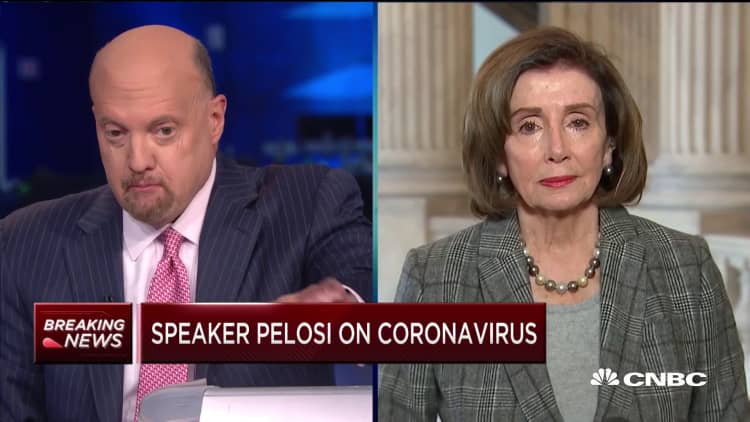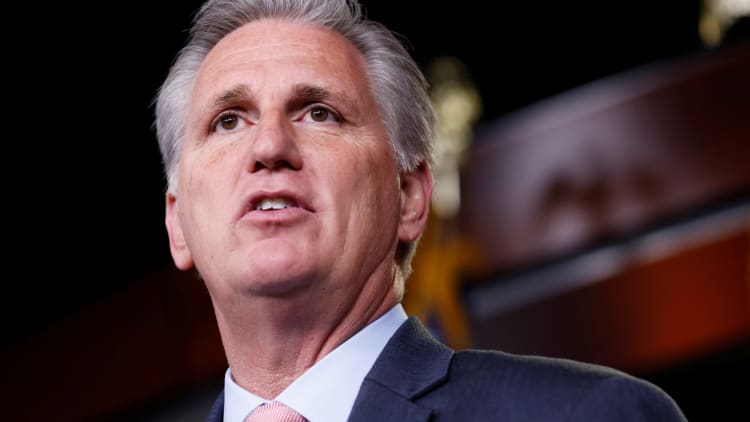
House Speaker Nancy Pelosi on Friday called for another bill to expand the provisions in the $2 trillion package Congress passed last week to limit the economic devastation from the coronavirus pandemic.
"Right now, I think that we have a good model. It was bipartisan, it was signed by the president. But it's not enough," Pelosi told CNBC's Jim Cramer after the government employment report showed the U.S. economy lost 701,000 jobs in early March as businesses started to shut down.
In the interview on "Squawk on the Street," the California Democrat said she wants more direct payments to individuals, beyond the chunks of up to $1,200 lawmakers just approved. She pushed for more small business loan funding on top of the $350 billion in the last law, and to extend beefed up unemployment insurance for two more months.
"Let's do what we just agreed to, except make it more current," the speaker said about what she wants to see in a fourth response bill. Pelosi added that an infrastructure proposal House Democrats outlined this week as a potential recovery plan "may have to be for a bill beyond this."
As the coronavirus spreads across the country, depleting health resources and sending the economy into free fall, Congress has started to consider whether it needs to offer more relief beyond the largest emergency spending package in U.S. history. Lawmakers will not return to Washington until at least April 20 as the crisis rapidly evolves.
The White House has shown openness to more economic rescue funding. President Donald Trump said Thursday the government will "probably do more" than the $2 trillion in stimulus money. He has pushed for an overhaul of U.S. infrastructure.
As the administration deals with the rocky rollout of small business loans designed to keep workers on payroll, Treasury Secretary Steven Mnuchin said Wednesday he would ask Congress for more funding if the $350 billion for the lifelines gets doled out quickly.
Congressional Republicans have sounded wary about spending more federal money now. Before the jobs report Friday, House Minority Leader Kevin McCarthy, R-Calif., told CNBC on Friday the "focus should be implementing those and making sure they're working."
"I think whatever we do in the next phase should be targeted, it should be at the recovery time of when we need to do it, but right now we should focused on implementing the trillions of dollars that we just passed," he told "Squawk Box."

Earlier this week, Senate Majority Leader Mitch McConnell said he wants to see how effective the last rescue package is before passing another bill.
In pushing to extend pieces of the emergency legislation, Pelosi stressed the bipartisan support it received in Congress. The GOP-led Senate passed it unanimously, and the Democratic-controlled House approved it by voice vote.
Republicans have opposed some of Pelosi's priorities for the coronavirus response, such as a national vote-by-mail requirement to make casting ballots safer during the crisis. She has also called for more grants to states fighting the crisis and tougher safety standards for Americans still required to go to work during the outbreak.
The unemployment insurance piece of the last stimulus package adds $600 per week in benefits to what qualified individuals normally receive from states. It lasts for four months, through July, and Pelosi hopes to extend it through September. It also covers some people not typically eligible for benefits such as independent contractors.
Some Republicans opposed the unemployment provisions, arguing they would deter Americans from working.
The flood of new jobless claims, roughly 10 million over a two-week period, has overwhelmed state systems.



